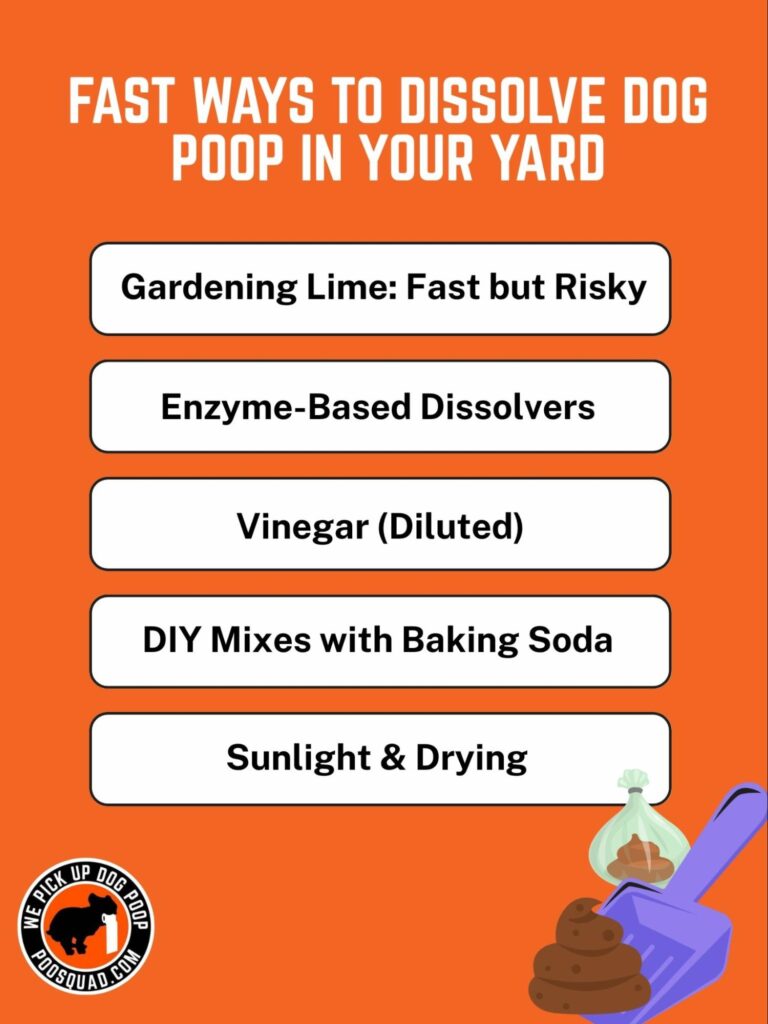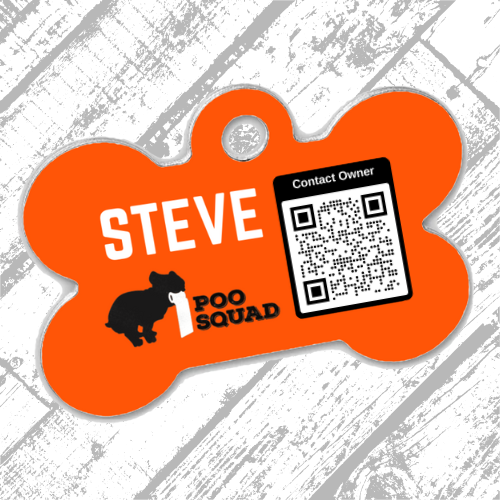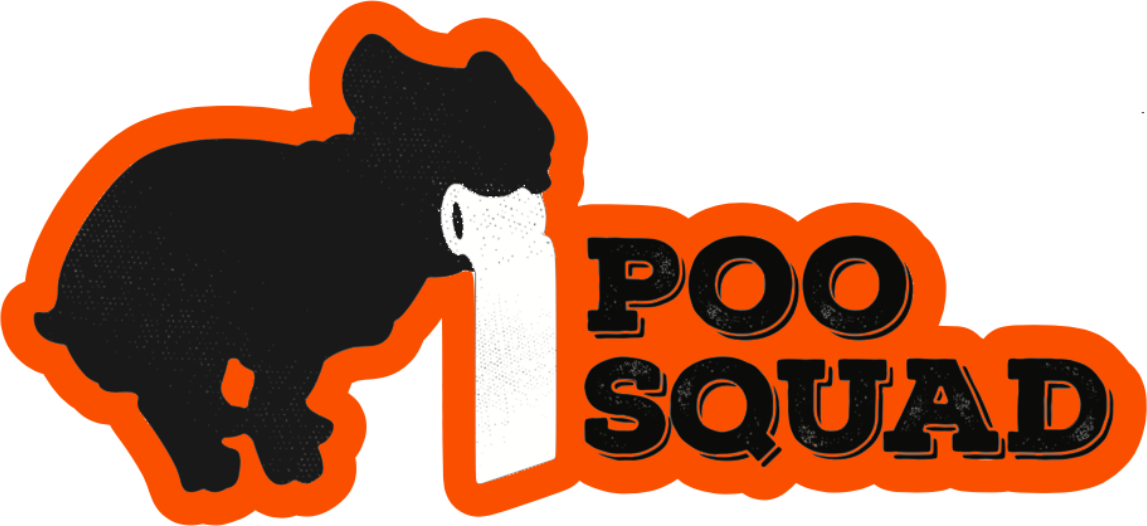To safely dissolve dog poop in your yard, use enzyme-based dissolvers, diluted vinegar, or pet-safe septic systems. Avoid bleach or lime, which can damage grass and harm pets. Enzymes offer the best long-term solution without harming soil, plants, or kids.

7 Fast Ways to Dissolve Dog Poop in Your Yard
1. Gardening Lime: Fast but Risky
Garden lime draws moisture out of poop and speeds up decomposition fast. It’s a go-to for vacant lots or forgotten corners of farmland. But around a family yard? Be careful. This stuff is highly caustic and can burn skin, pets’ paws, or leave bald patches on your lawn. It’s effective, but the trade-offs are real.
2. Enzyme-Based Dissolvers
These products are designed to break down waste naturally using bacteria and enzymes that mimic what happens in your dog’s gut. They’re usually safe for grass and pets, and they don’t carry the harsh chemical smell of other methods.
The downside is that they’re not instant. Expect a few applications, and don’t be surprised if a cheaper brand falls flat. That’s why some folks pair them with pet-safe deodorizer treatments for extra impact.
Some users wonder if these products are just hype. The truth is, the good ones work, but they work over time, not overnight.
3. Vinegar (Diluted): A Natural Option
Vinegar is one of those household heroes that shows up in every DIY list. Its acidity helps weaken and break down waste while cutting odor. But it doesn’t kill bacteria, and it’s no match for a week’s worth of dog bombs in hot weather. Use it diluted to protect grass and curious toddlers, and be prepared to repeat the treatment every few days.
4. DIY Mixes with Baking Soda, Peppermint Oil, or Sodium Bicarbonate
Sprinkle some baking soda, add a few drops of peppermint oil, and wait for magic. It’s cheap, simple, and smells better than most other options, but don’t expect miracles.
These mixes are better at masking odor than dissolving actual poop. They’re also safest when applied in small doses and away from delicate plants or gardens.
5. Dog Poop Septic Digesters
In-ground digesters like the Doggie Dooley are miniature septic tanks for your yard. You drop in poop, add water and enzymes, and let the system handle the rest.
They’re great for households with multiple dogs, but installation takes effort, and ongoing enzyme refills cost money. Still, for dedicated dog families who want zero mess, these systems are a long-term win.
6. Commercial Odor Eliminators with Digesting Enzymes
These products combine odor control with enzyme digestion. Usually found in powder or spray form, they’re marketed as all-in-one solutions. Some are legit; others are just perfume with a label. When they work, they’re a clean way to reduce smell and speed breakdown, but always check the ingredient list and start with a small patch of lawn to avoid damage.
7. Sunlight & Drying (The Slowest Method)
Letting nature handle it sounds great, until you realize how long that takes. Sunlight will dry out feces over time, but it doesn’t sanitize anything. The smell lingers, bacteria stick around, and no one wants to host a barbecue next to a crusty turd. It’s the lowest-effort method, but also the least effective.
Safe for Your Lawn? Solutions That Won’t Kill Grass or Flowers
What’s Safe Around Kids, Pets, and Gardens?
When choosing how to break down dog waste, yard safety is just as important as cleanup speed. If you’ve got toddlers running around barefoot or pets who like to roll in the grass, a bad dissolver choice can do more harm than good.
Diluted vinegar is one of the safer bets; it’s non-toxic and biodegradable. Just be aware it carries a strong scent and may need repeated use. Enzyme-based dissolvers offer the best overall balance. They’re designed for pet areas, work with most grass types, and don’t carry the same risks as harsher options.
On the other hand, skip bleach and go light on lime. Both can scorch grass, leach into flower beds, and leave you dealing with more damage than you started with.
If you want a cleaner yard without trading off your lawn’s health, it’s worth looking into safer sanitation methods paired with routine pet waste services.
What to Avoid Completely
Not all cleanup shortcuts are worth taking. Here’s what to steer clear of:
- Bleach: Effective at killing bacteria, but also kills your grass and soil quality in the process.
- Excessive Lime: A little may work, but too much will eat away at your lawn and potentially cause chemical burns.
- Storm Drain Flushing: Besides being illegal in most places, it can contaminate local waterways and drinking supplies.
There’s a smarter way to handle waste without turning your yard into a chemistry experiment. The key is finding a solution that works with your lifestyle, not against your landscaping.
Odor, Health & Hygiene: Why It’s About More Than Just Convenience
It might seem harmless, but dog waste is anything but. Just one gram can carry over 23 million coliform bacteria, and that’s not counting parasites like Giardia or roundworms. When left to dissolve on its own, poop can seep into the soil, run off into storm drains, and end up polluting local water systems. Beyond that, it attracts flies, rodents, and other pests you don’t want anywhere near your home.
DIY Doesn’t Equal Clean
Some at-home methods promise a quick fix, baking soda here, vinegar there, maybe a little essential oil. But while the smell might fade for a day, the waste doesn’t disappear. Bacteria still linger, and in many cases, those DIY approaches just spread the problem further across your lawn.
That’s where high-quality enzyme cleaners stand out. The right blend doesn’t just mask odors, it breaks down the waste at the microbial level. You don’t need to overthink chemistry, but you do need to make sure what you’re using is doing more than just covering things up.
Bonus: Real Sanitation That Goes Beyond the Surface
The difference between good enough and clean often comes down to the follow-through. That’s why some people choose a more complete service, one that doesn’t rely on garden hoses or trash cans and doesn’t cross-contaminate between yards.
Every cleanup visit includes sanitized tools, shoe disinfection, and a final gate check with photo proof. If there’s anything off with the waste, you get notified with a simple report that flags potential health issues. And because nothing gets left behind, not even the smell, your yard stays fresh, safe, and ready for whatever the day brings.
Common Misconceptions (and What You Should Do Instead)
Rain Will Wash It Away – Nope
It might feel like a storm will do you a favor, but rain doesn’t clean your yard; it just spreads the problem around. Moisture helps bacteria thrive and carry waste into nearby soil and water systems. So, instead of helping, rain can make the contamination worse.
I Just Mow Over It – Big Mistake
This one comes up a lot. People say they just run it over with the mower and call it good. All that does is blast tiny particles across your yard and into the air. It’s not cleaner. It’s not faster.
It’s just a way to aerosolize bacteria and get them on your shoes, tools, and grass clippings. If you’ve got kids or pets playing outside, that’s a mess you don’t want to gamble on.
Dog Poop Is Fertilizer– Not
Here’s a common myth that needs to go: dog poop is not good for grass. Unlike cow manure, dog waste is packed with nitrogen and ammonia, enough to burn your lawn and kill off healthy turf.
On top of that, it carries pathogens that stick around long after the poop’s gone. If you’re hoping for greener grass, there are far better ways to feed it. This one backfires every time.
Long-Term Yard Solutions (So You Never Worry Again)
Pet-Safe Deodorizer Services
A clean yard goes beyond removing waste; it’s about what’s left behind. Even after poop is gone, bacteria and odors can linger in the grass and soil. That’s where deodorizer treatments come in.
These services use pet-safe products to sanitize high-traffic zones like patios, dog runs, and lawns, helping extend the life of your grass and keeping smells from creeping back in. It’s one of those small upgrades that make a big difference, especially during summer heat or rainy seasons.
Automate It Like the Pros
The easiest yard to manage is the one you don’t have to think about. With smart scheduling systems, some services send an 8 am reminder on your scoop day and another heads-up 10 minutes before arrival. Add in a client hub with automated billing, and it’s one less chore on your plate.
Consider the Poo Squad Pet ID Program

There’s one feature that surprises people the most: the free custom pet ID tags. Each one comes with a QR code linked to a digital pet profile. If your dog ever gets out and someone finds them, they just scan the tag and reach you instantly. It’s a small touch, but it turns a routine poop pickup into something bigger, peace of mind that goes beyond the backyard.
What’s the Best Way to Dissolve Dog Poop?
| Method | Speed | Safety | Cost | Effectiveness |
| Gardening Lime | Fast | Low (harsh on grass) | Low | High (short-term) |
| Enzyme-Based Dissolvers | Moderate | High (pet/kid-safe) | Moderate | High (long-term) |
| Vinegar (Diluted) | Slow | High | Low | Moderate |
| DIY Mixes (Baking Soda, etc.) | Slow | Moderate | Low | Low |
| Dog Poop Septic Digesters | Moderate | High | High | High (ongoing) |
| Commercial Odor + Enzyme Sprays | Moderate | High | Moderate | High |
| Sunlight & Drying | Very Slow | High | Free | Low |
For fast and safe dog poop breakdown, enzyme-based dissolvers and pet-safe sprays offer the best results without damaging your lawn.
Harsh chemicals may work quicker, but they come with risks. Consistent, professional care is the only hands-free option that does it all right.
Want a hands-free, health-first solution? Poo Squad’s poop pickup and sanitation services keep your yard safe, clean, and smell-free, without the guesswork.
What People Still Want to Know
How long does dog poop take to dissolve naturally?
If left alone, dog waste can take anywhere from two to three months to fully break down, assuming the weather cooperates. Rain, heat, and bacteria all play a role, but during colder months or dry spells, it lingers even longer.
Can I use dissolvers on artificial turf?
Only certain products are safe. Stick with pet-safe enzyme sprays that are designed for synthetic surfaces. Harsh chemicals can damage the turf fibers or trap odors beneath the surface.
What’s the fastest non-chemical method?
Lime works quickly, but it comes with safety risks. Enzymatic sprays are the safer, more controlled option, even if they take a little longer to finish the job.
Are there HOA-safe solutions?
Yes. Most communities allow pet-safe odor eliminators and enzyme treatments. For added peace of mind, some services offer receipts and documented service logs, which can be handy if your HOA asks for proof of maintenance.
Can I compost dog poop?
You can, but don’t toss it in with your vegetable trimmings. It requires a separate, specialized composting system built to handle pathogens. Most home setups aren’t equipped for that, but for the determined DIYer, it’s possible with the right setup.
